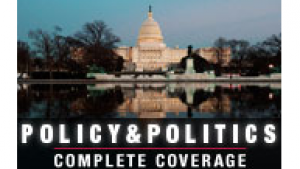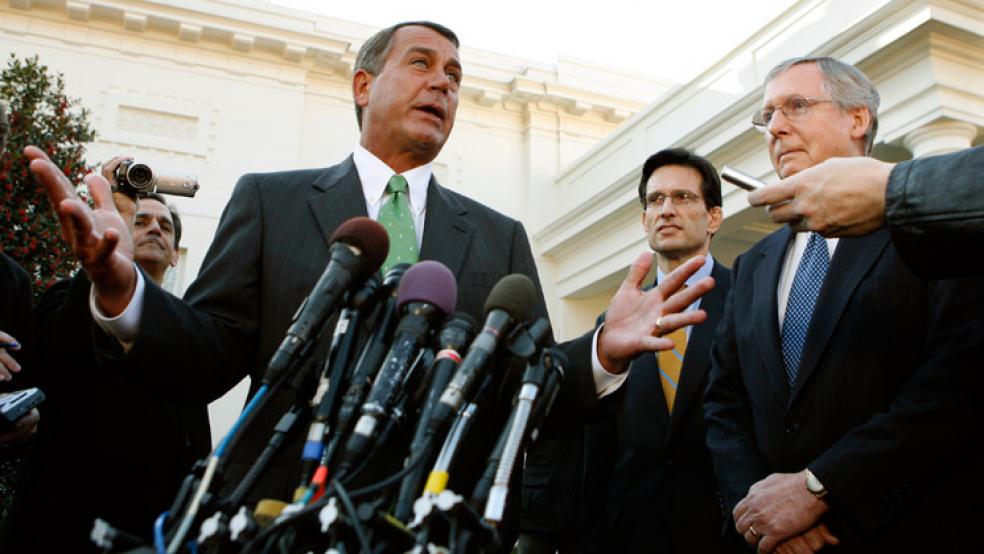 Once a happy band of no-nonsense, pro-business conservatives, cautious in everything from money to marriage — including their wary response to the onward march of 1960s liberal social values — they were prepared, within reason, to trim their policies to match the voters' mood. After all, to achieve anything in government you first have to win elections.
Once a happy band of no-nonsense, pro-business conservatives, cautious in everything from money to marriage — including their wary response to the onward march of 1960s liberal social values — they were prepared, within reason, to trim their policies to match the voters' mood. After all, to achieve anything in government you first have to win elections.
But that was before the revival in fundamental conservatism that has turned the GOP from a pragmatic party to a collection of inward-looking ideological tribes. Republicans puzzled by the rise of dogma and division in their party can find answers in a new survey that explains how large the factions are and what they think. They will be surprised by the findings.
RELATED: MORE SHUTDOWN FALLOUT FOR THE GOP IN THE SENATE
The GOP has long been considered a three-legged stool: big business, Southern evangelical Christians and anti-government Westerners. But, largely since the world financial panic of 2008-9, these three have been joined by two new aggressive, popular movements: the Tea Party and the libertarians.
To put the transformation of the GOP in context: the only postwar departure from steady, old-school Republican moderation was an experiment in conservative radicalism in 1964 when the government-hating Barry M. Goldwater became the party's presidential champion.
The result was disaster: "Mr. Republican" was painted by his opponent President Lyndon B. Johnson as a trigger-happy rube who would trip nuclear war with the Russians.
LBJ won by 61 percent to Goldwater's 38 percent, and 486 Electoral College votes to Goldwater's 52. A glance at the 1964 election map shows America a sea of blue, with the GOP penned in to Goldwater's home state of Arizona plus the rump of the old confederacy. The lesson was clear: Don't put up a radical, rash, Washington-hating, conservative unless you want to lose in a landslide.
Goldwater paved the way in 1980 for the likeable Ronald Reagan, who put a Hollywood gloss on ultra-conservatism. Once in the White House, the former California governor turned out to be more amenable to horse-trading than his obdurate campaign rhetoric suggested. Despite declaring he would cut taxes and reduce borrowing, he raised them and increased public borrowing even more.
But even Saint Ron is forgotten by today's GOP base, who demand no compromises, no bargaining in Congress, no tax rises, no politics as usual.
The inevitable result of this intransigence — the government shutdown — has also spelled disaster: Republican approval ratings are on the floor, the GOP suffered a humiliating defeat in Congress and the posturing of the conservative and libertarian revolutionaries ended in a squeak. Even Goldwater would have shunned a strategy that amounted to such a conspicuous display of impotence.
RELATED: HOUSE GOP SUFFERS EPIC COLLAPSE IN PUBLIC SUPPORT
What has happened to the once great Republican Party, an election-winning machine that has made it a bitter battleground between dogmatic and pragmatic conservatives? A new study spells out the splintering of conservatism and the entry of opponents of conservatism into the GOP that must make uncomfortable reading for the party's big business donors.
If big business continues to bankroll the GOP, who exactly are they backing? And what exactly would a Republican president and a Republican Congress do if elected? Little wonder that big business groups like the U.S. Chamber of Commerce is considering backing moderate candidates in upcoming GOP primaries.
THE GOP’S DIVIDED VALUES
The new Public Religion Research Institute (PRRI) report has many of the answers. Republicans used to split along familiar lines, with legions of evangelical Christians leading a moral crusade tempered by worldly business conservatives throwing millions of dollars at the party leadership. Into this cozy arrangement, two new strains of conservatism have emerged, neither of which is particularly conservative.
Even before the crash of 2008 and the 2009 fiscal stimulus that ignited the Tea Party, libertarians had begun infiltrating the Republican Party. Their emphasis is a belief that the problem with almost everything is the government — or what everyone else calls the democratic will of the people.
There is no better indication of this insurgency than the career of former Representative Ron Paul from Texas. (Father of the current Tea Party favorite, Senator Rand Paul from Kentucky.) In 1987, when Reagan was in the White House, Ron Paul resigned from the GOP to become the Libertarian Party's presidential candidate. The result was disaster for Paul: He received just 0.47 percent of the popular vote. George H.W. Bush, the last Northeastern Republican to win the presidency, won with 53 percent.
Undeterred, Paul took a lesson from the insurgents' handbook and decided that if he could not win by being true to himself he would return from self-exile and work within the ranks of the GOP for the libertarian revolution. The PRRI survey shows how Paul's gambit has fared. Fewer than one in 10 (7 percent) Americans consider themselves libertarians today, with 15 percent leaning towards libertarianism.
Libertarians make up one-eighth (12 percent) of the Republican Party; one in five (20 percent) party members backs the Tea Party; one-third (33 percent) consider themselves part of the "religious right." That leaves moderate Republicans making up just one-third (35 percent) of the GOP.
RELATED: GOP FUNDERS TIGHTEN THE PURSESTRINGS OVER SHUTDOWN
Libertarianism is commonly confused with support for the Tea Party, but as the survey shows, the two movements are incompatible. While a quarter (26 percent) of Tea Party supporters describe themselves as libertarians, more than half (52 percent) think of themselves as part of the religious right. Yet a quarter of libertarians have no religious affiliation of any sort.
When it comes to abortion, the differences are more stark. While 57 percent of libertarians support a woman's right to an abortion, most Republicans in general (58 percent), most Tea Party supporters (58 percent), and most white evangelical Protestants (68 percent) strongly oppose it.
On mercy killing, the differences are just as pronounced. Seven out of 10 libertarians think patients and doctors should be allowed to end a life with lethal drugs if the quality of a dying person's life is fast diminishing. (So much for the faux rage about the mythical Obamacare "death panels.") Again, 58 percent of Republicans in general and 70 percent of the religious right are deeply opposed to such a godless approach to human life.
Then there is the legalization of marijuana. Seven out of 10 libertarians are in favor, but 60 percent of mainstream Republicans and 70 percent of conservative evangelicals are against.
On the issue of same-sex marriage, 60 percent of libertarians oppose it. Yet that does not equal the vehemence against gay nuptials of mainstream Republicans (67 percent), the religious right (62 percent) or the Tea Party (73 percent).
The killer fact: While 57 percent of libertarians have a positive view of the GOP, a full 40 percent have an unfavorable view. What do you call a party within a party when four out of 10 in that faction actively dislikes the mother party they affect to support? Some would answer schismists and dogmatists. Others would suspect entryists.
NO COUNTRY FOR MODERATE MEN
So where does this leave moderate Republicans? Angry, frustrated and in deep despair. The woeful display of suicidal leadership that led to the government shutdown has made it plain even to those in denial that in the last five years, the Republican Party has become a depository for incompatible extremes. This is undermining the GOP's ability to operate effectively as a political party — let alone have the intellectual coherence to form a strong government.
Until the internecine battle for the soul of the Republican Party has been concluded, the three extremes will continue to scrap with little prospect of working together effectively. Each faction is incapable of moving away from its core beliefs, yet those beliefs are irreconcilable and are not up for negotiation. An abortion-loving, pot-smoking, mercy-killing libertarian can never become a God-fearing, abortion-hating, born-again evangelical. Debate is sterile and pointless.
In a slightly different context, the conservative Stanford economist John B. Taylor suggested this week, "Rhetoric aside, many both inside and outside the government quite reasonably seek to return to the kinds of policies that worked well in the not-so-distant past. Claiming that one political party has been hijacked by extremists misses this key point, and prevents a serious discussion of the fundamental changes in economic policies in recent years, and their effects."
What the PRRI survey explains, for those prepared to listen, is that the Republicans have indeed been "hijacked by extremists" and it is those who do not recognize the fact and fail to ponder what to do about it that are missing the key point.
The extremists are making the GOP ungovernable and unelectable. Ask any moderate Republican — if you can find one prepared to answer to that name.





